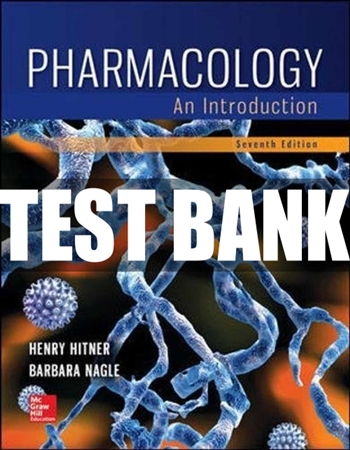Description
Test Bank For Pharmacology An Introduction 7Th Edition By By Henry Hitner
Chapter 02
Pharmacokinetics and Factors of Individual Variation
Multiple Choice Questions
1. Identify the term used for the process by which a drug enters the bloodstream from its site of administration.
A. Drug absorption
B. Drug excretion
C. Drug distribution
D. Drug metabolism
Drug absorption refers to the entrance of a drug into the bloodstream from its site of administration.
ABHES: 3.a. Define and use entire basic structure of medical words and be able to accurately identify in the correct context, i.e. root, prefix, suffix, combinations, spelling, and definitions
Blooms: Remember
CAAHEP: I.C.11.a. Identify the classifications of medications including indications for use
Difficulty: 1 Easy
Learning Outcome: 02.02
2. Identify the drug that is available as a transdermal patch system.
A. Nitroglycerin
B. Clonidine
C. Estrogen
D. All of the above
Transdermal products are administered through a bandage or patch system. Nitroglycerin, estrogen, and clonidine are drugs available in this form.
ABHES: 6.d. Properly utilize Physician’s Desk Reference (PDR), drug handbook and other drug references to identify a drug’s classification, usual dosage, usual side effects, and contraindications
Blooms: Remember
CAAHEP: I.C.11.a. Identify the classifications of medications including indications for use
Difficulty: 1 Easy
Learning Outcome: 02.01
3. Identify the drug form that contains dried and finely ground drugs or drug extracts.
A. Powders
B. Tablets
C. Troches
D. Capsules
Powders are drugs or drug extracts that are dried and ground into fine particles.
ABHES: 6.d. Properly utilize Physician’s Desk Reference (PDR), drug handbook and other drug references to identify a drug’s classification, usual dosage, usual side effects, and contraindications
Blooms: Remember
CAAHEP: I.C.11.a. Identify the classifications of medications including indications for use
Difficulty: 1 Easy
Learning Outcome: 02.01
4. Identify the medical condition that the drug form known as a “troche” is commonly used to treat.
A. Asthma
B. Bradycardia
C. Sore throat
D. Toothache
Troches are flattened tablets that are allowed to dissolve in the mouth. They are commonly used for colds and sore throats.
ABHES: 6.d. Properly utilize Physician’s Desk Reference (PDR), drug handbook and other drug references to identify a drug’s classification, usual dosage, usual side effects, and contraindications
Blooms: Understand
CAAHEP: I.C.11.a. Identify the classifications of medications including indications for use
Difficulty: 1 Easy
Learning Outcome: 02.01
5. Among the factors that affect drug distribution, the factor that plays the biggest role in determining the concentration of a drug that penetrates the brain by overcoming the blood–brain barrier is:
A. lipid solubility.
B. blood circulation.
C. plasma protein binding.
D. GI absorption rate.
An additional lipid barrier, the blood–brain barrier, protects the brain by restricting the passage of electrolytes and other water-soluble substances. Since the brain is composed of a large amount of lipid (nerve membranes and myelin), lipid-soluble drugs pass readily into the brain. As a general rule, then, a drug must have a certain degree of lipid solubility if it is to penetrate this barrier and gain access to the brain.
ABHES: 2.a. List all body systems, their structure and functions
Blooms: Understand
CAAHEP: I.C.7. Describe the normal function of each body system
Difficulty: 1 Easy
Learning Outcome: 02.02
6. Identify the drug preparation that is described as a solution containing water, sugar, and a drug.
A. Elixir
B. Tincture
C. Syrup
D. Fluid extract
Syrups are commonly used aqueous preparations. A syrup is a solution of water and sugar to which a drug is added.
ABHES: 6.a. Identify drug classification, usual dose, side effects, and contraindications of the top most commonly used medications
Blooms: Understand
CAAHEP: I.C.11.a. Identify the classifications of medications including indications for use
Difficulty: 1 Easy
Learning Outcome: 02.01
7. The processes of drug absorption, drug distribution, drug metabolism, and drug excretion are components of the study known as _____.
A. synergism
B. pharmacokinetics
C. bioavailability
D. enzyme induction
Pharmacokinetics is a study of the factors that determine drug absorption, drug distribution, drug metabolism, and drug excretion.
ABHES: 3.a. Define and use entire basic structure of medical words and be able to accurately identify in the correct context, i.e. root, prefix, suffix, combinations, spelling, and definitions
Blooms: Understand
CAAHEP: I.C.11.a. Identify the classifications of medications including indications for use
Difficulty: 1 Easy
Learning Outcome: 02.02
8. Identify the usual range of alcohol concentration used in alcoholic preparations of drugs such as elixirs, spirits, tinctures, and fluid extracts.
A. 35 to 45 percent
B. 25 to 35 percent
C. 20 to 25 percent
D. 5 to 20 percent
Elixirs, spirits, tinctures, and fluid extracts are drugs dissolved in various concentrations of alcohol, usually in the range of 5 to 20 percent.
ABHES: 6.d. Properly utilize Physician’s Desk Reference (PDR), drug handbook and other drug references to identify a drug’s classification, usual dosage, usual side effects, and contraindications
Blooms: Understand
CAAHEP: I.C.11.a. Identify the classifications of medications including indications for use
Difficulty: 1 Easy
Learning Outcome: 02.01





Be the first to review “Test Bank For Pharmacology An Introduction 7Th Edition By By Henry Hitner”